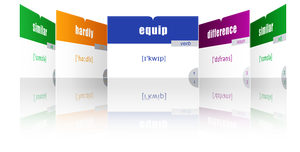Thomas
- Подробности
- 2837
Living English
|
Traffic |
|
|
#1 One of the things that I find very tiring about life in the city is the constant roar of the traffic. Sometimes it becomes so stressful for me that I just want to run away and hide, but I imagine it must be just as stressful for a driver to try to get through the center of town in the rush-hour. I always feel so threatened when trying to cross busy streets. Especially here, in Hungary, where cars don't always stop at pedestrian crossings, or even at traffic lights. I never want to drive a car. OK, I'm happy to go in them when they're there, when they're going where I am and when there's space, for example when hitch-hiking or going somewhere with friends, but I feel there are really enough cars and roads already. There's enough constant noise and there are enough dirty, smelly petrol fumes, and even if I can't see a way to make this problem better, I don't want to be part of the problem, to make it worse. |
# Что меня постоянно утомляет в городской жизни, так это вечный шум транспорта. Иногда он становится для меня таким невыносимым, что хочется убежать и спрятаться. Представляю, насколько тяжело для водителя ехать через центр города в час "пик". Мне всегда страшно переходить улицы с большим движением. Особенно здесь, в Венгрии, где водители не всегда останавливаются у пешеходных переходов и даже у светофоров. Мне совсем не хочется водить машину. Ну, хорошо, мне нравится ехать на них, когда есть место и они едут в том же направлении, что и я, например, когда я еду автостопом или куда-нибудь добираюсь с друзьями, но мне кажется, уже достаточно машин и дорог. Достаточно постоянного шума и грязных вонючих бензиновых выхлопов, и хотя я сам не вижу решения этого вопроса, я не хочу стать частью этой проблемы и сделать ее еще напряжённей. |
|
#2 I think that a trip to another country, or to visit distant friends, or simply to travel a long way would be much less convenient without cars, but maybe then we would value the trip more and use our time spent away more efficiently. There's also the factor that cars seem to be made to be a disposable commodity nowadays. Cars produced now only last for a couple of years and then they don't work or seem to be out of date. Also, many people change their car every two years and so they don't look after their cars and keep them in good working order. I mean, a well-looked after car can, I'm sure, last for fifteen years, but because people think about them as something which they will change anyway, people don't put so much energy into keeping up the condition of their cars as they used to. And what should we do with the useless shells of the old, broken-down cars? There seems to be no viable way to recycle them. They just end-up on scrap-heaps, out of sight and out of mind. These scrap-heaps get bigger and bigger, and they take up good space. |
# Мне кажется на большие расстояния в гости к друзьям, с визитом в другую страну или просто в путешествии было бы менее удобно без машин, но, может быть, мы бы тогда больше ценили путешествия и более эффективно проводили бы наше время. Еще нужно помнить, что машины сегодня производятся как одноразовый товар. Машины делаются, чтобы служить несколько лет, а затем они просто устаревают. Кроме того, многие меняют машины каждые два года. Эти люди не ухаживают за своими машинами и не содержат их в рабочем состоянии. Я имею в виду, что если за машиной ухаживать как следует, то она, я уверен, может прослужить пятнадцать лет, но поскольку люди думают о машинах, как о чем-то временном, что они все равно будут менять, то они и не стараются их содержать в необходимых условиях, как это делалось раньше. А что мы должны делать с бесполезными кузовами старых сломанных машин? Ведь все еще нет эффективного способа их переработки. Их просто сваливают в утиль с глаз долой. Эти кучи становятся все выше и выше и занимают все больше места. |
|
#3 Nowadays, cars are seen as an essential part of life, but a hundred years ago they weren't, and people still managed to go about their lives as they always had done without them. Long distance travel was by horse, or later by train, and I greatly prefer these two alternatives. As I said before, I think this problem can be helped, really, by a greater and more extensive use of public transport. |
# Сейчас машины кажутся важной частью жизни, но сто лет назад так не было, и люди вполне могли обходиться без них. На большие расстояния ездили на лошадях или на поезде, и мне предпочтительней эти виды транспорта. Мне кажется, эту проблему можно облегчить, если больше пользоваться общественным транспортом. |
|
#4 Budapest is really an exceptional place in that the public transport system is really so regular and so comprehensive. I think that this must be something left over from the communism, when the government were anxious to make sure that people could get to and from work every day. Budapest is one of the few places I've been to where you know that all of the buses will come on time, and they come at such short intervals that it's rare, apart from in the middle of the night, that you have to wait more than 20 minutes for a bus. In England, this is not the case. You can wait for an hour for a bus that should have been there 5 minutes ago. Within Budapest, you can get from one location to another very quickly. There is, however, the disadvantage that because I know that I can get to any place in Budapest within a short period of time, I'm more inclined to spend my day in many different locations, rushing about, doing one thing and then another. Because of this, I seem to spend half of my life on buses, underground trains or trams. This used to be very frustrating, but now I've found a way to get over this, to have something to do on public transport, for example to bring a walkman and to listen to some of your favorite music, or to bring a book. I think that these things can make travelling on public transport a lot less stressful. |
# В Будапеште исключительно хорошо отлаженная широкая транспортная система. Мне кажется, это осталось еще с коммунистических времен, когда правительству было важно, чтобы рабочие каждый день добирались с работы и на работу. Будапешт - одно из немногих мест, в которых я побывал, где вы уверены, что автобус придет вовремя, и интервалы движения у них очень короткие, что крайне редко, за исключением поздней ночи, вам придётся ждать больше двадцати минут. В Англии это не так. Вы можете прождать целый час автобус, который должен был прийти через пять минут. В Будапеште можно очень быстро добраться из одной части города в другую. Правда, есть в этом и недостаток, потому что зная, что можно быстро добраться в любую часть Будапешта, планируешь побывать во многих частях города, начинаешь метаться, делать и то, и другое. Из-за этого, мне кажется, я провожу полжизни в автобусах, трамваях и метро. Раньше это очень утомляло, но я нашел способ бороться с этим: надо что-нибудь делать в дороге, например, взять с собой плеер и слушать любимую музыку или читать книгу. По-моему, от этого станет легче передвигаться на транспорте. |
|
#5 People in Budapest, on public transport, I don't know why, always seem very sad and very closed off from each other. I have also found this in other cities. The tube in London is a notorious example of lack of communication. Everybody on the tube sits next to each other just reading their papers, or looking into the mid-air. It seems to be absolutely forbidden to look at another person. Maybe this is just something about cities in general, I don't know. |
# Люди в транспорте в Будапеште, не знаю почему, кажутся очень печальными и закрытыми друг от друга. То же я обнаружил и в других городах. Метро в Лондоне - типичный пример отсутствия общения. Все сидят рядом друг с другом, читают газеты или просто смотрят в пространство. Кажется, будто им запрещено смотреть друг на друга. Возможно, такими являются все большие города. |
|
#6 I often accompany Maria to school in the morning and as this takes about half an hour of traveling on public transport, we generally occupy our time by reading together. From leaving the house in the morning, it takes us about 4 or 5 minutes to walk to the tram or the bus, whichever we decide to take. From where we live, there are a couple of buses we can take that go to the center of town. They both arrive at underground stations sooner or later, so then we can change to the underground and many of the parts of the town are accessible within a very short period of time. Or we can take a tram from just near our house to Blaha Lujza ter, and from there, there are many possibilities to change to another tram, bus or underground train. |
# Я часто сопровождаю Марию по утрам в школу, а это примерно полчаса на общественном транспорте, обычно, мы читаем что-нибудь вместе. От дома до остановки автобуса или трамвая нам идти минут пять, на чем бы мы ни решили ехать. От нас до центра идут два автобусных маршрута. Они оба подъезжают к станциям метро рано или поздно, там мы можем затем пересесть на метро и быстро добраться до многих районов города. Или мы можем сесть на трамвай недалеко от дома и доехать до Блаха Луиза Тер, а там много возможностей пересесть на другой трамвай, автобус или метро. |
|
#7 I'm not so keen on the underground myself. I don't really like to be so far underground and traveling at such a high speed. It doesn't really feel natural to me, and often I get quite claustrophobic, sometimes also a little bit disorientated by it, but the underground is often a calmer place to be than on the crowded buses at between 8 and 10 in the morning, for example, or between half past five and seven in the evening. Everybody squeezes onto the buses, as they all want to go to work or go home of course, and sometimes it's not even possible to breathe on the buses in the rush-hour. The worst example of this that I've experienced is the number 95 which goes from Keleti Station to near our home. In early evening, it can be like a can of sardines, really. It fills up so fast, and then at every stop, more and more people want to get on. Sometimes there are people really pushing their way onto the bus, trying to cram in to get a place so they can get home. At these times of the day, of course, the buses go a lot more slowly than they do in the middle of the day or in the evening, as there's so much traffic on the roads. Sometimes I've found that, for example, a bus journey which by the night bus takes 10 minutes, at these times of day can take more than half an hour. This can be really very stressful. |
# Мне метро не очень-то нравится. Не люблю находиться глубоко под землей и быстро ехать. Это неестественно для меня и иногда становится страшно от замкнутого пространства, и даже иногда теряешься, но метро спокойнее переполненных автобусов, например, между 8 и 10 часами, утра, или по вечерам между полшестого и семью часами. Все пытаются втиснуться в автобус, потому что, конечно, всем хочется вовремя попасть на работу или вернуться домой. Иногда, в час пик даже невозможно вздохнуть в переполненном автобусе. Самый плохой маршрут, на котором мне довелось ездить, это 95, он идет от вокзала Келети к моему дому. По вечерам он просто напоминает бочку с селедкой. Он так быстро заполняется народом, на каждой остановке людей набивается все больше и больше. Иногда люди буквально врываются в автобус, стараясь занять место, чтобы попасть домой. В такое время, конечно же, автобусы едут гораздо медленнее, чем днем или ночью, потому что на дорогах очень большое движение. Иногда, как я выяснил, поездка, которую ночной автобус совершает за десять минут, в часы пик может длиться более получаса. Это очень нервирует. |
|
#8 The trams normally aren't too slowed down by masses of traffic on the roads, as they have separate lines to go on where cars aren't allowed to go. So, generally, I prefer to take a tram at busy times, because I know that I'm gonna get there on time and not be too slowed down by other traffic on the roads, whereas if I take the bus I really can't be sure when I'll get home. |
# Трамваи не слишком зависят от интенсивности движения, потому что трамвайные пути отделены от остального транспорта и машинам не разрешается по ним ездить. Поэтому в часы пик я предпочитаю ездить на трамвае, потому что знаю, что приеду вовремя и не задержусь из-за другого транспорта на дорогах в то время как на автобусе я не могу быть уверенным что быстро попаду домой. |
|
#9 When I can, I really enjoy going from one town to another by train, as long as the train isn't too full. It's quite peaceful to sit and listen to the chug-a-chug of the train. Trains generally aren't too shaky, so it's possible to read or to write whilst traveling, and it can be very peaceful and relaxing to be sitting on a train for a couple of hours. |
# Я очень люблю при возможности ездить в другие города на поезде. Если, конечно, поезд не слишком переполнен. Тихо себе сидишь и слушаешь перестук колес. Поезда, обычно, не очень качаются, так что в дороге можно читать и писать, и вообще, пару часов всегда приятно посидеть в поезде в тишине и спокойствии. |
|
#10 One of the disadvantages of driving a car is that, especially with older cars, you can never be quite sure if the car is going to reach its destination. OK, of course this is the same with any form of public transport as well, even buses can break down or things like this, but it seems that public transport generally is at least more reliable than, for example, Maria and her sister's car, which is an old Trabant, and it really is risking half of the day spent pushing it to get in it, even to go a short distance. Cars often cost so much to get repaired when they break down. I'm sure that it's very unusual that buying a car and maintaining it, and also continuing to fill it with petrol, saves money on public transport - cars are normally quite an expensive business. |
# Один из недостатков в вождении машины, особенно старой, в том, что никогда не уверен, доедешь литы куда надо. Конечно, и общественным транспортом можно тоже не доехать, даже автобусы ломаются и т.д, но все равно, общественный транспорт, в целом, по крайней мере, более надежен, чем, например, машина Марии и ее сестры, старый "Трабант", рискуешь полдня толкать машину, прежде чем сядешь в нее, даже если едешь на короткое расстояние. Машины дорого ремонтировать, когда они ломаются. Я уверен, что покупка и уход за машиной, а также постоянная заправка ее бензином, не дешевле, чем езда на общественном транспорте. Машины - дорогое удовольствие. |
|
#11 The main advantage of cars, of course, is that you can go where you want and when you want, and this can make things a lot more convenient. |
# Главным преимуществом машин, конечно, является то, что можно ехать куда захочешь и когда захочешь, а это намного удобнее. |
|
#12 It's a personal choice, of course whether or not to be a driver, but my mind is well made up. |
# Конечно, каждый сам выбирает, ездить ему на машине или нет, но я уже все давно для себя решил. |








 Как правильно изучать английский язык по карточкам (статьи)
Как правильно изучать английский язык по карточкам (статьи)